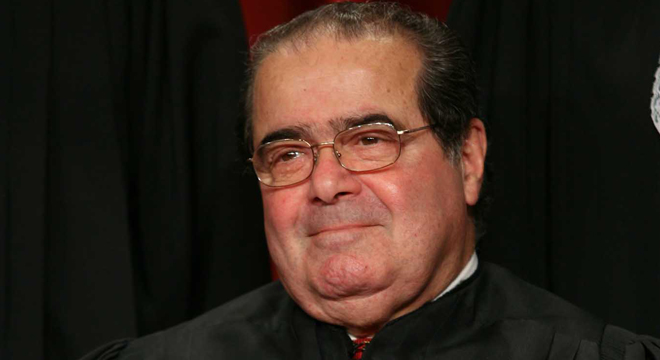Justice Antonin Scalia’s misgivings about President Obama’s health care law were evident to all observers during this week’s three days of Supreme Court arguments on its constitutionality.
But his skepticism went beyond probing questions about Congressional power and interstate commerce. At various points, the justice’s questions echoed lines of attack you’d just as likely read on a conservative blog or in a Republican National Committee email blast.
Here are Scalia’s top five Supreme Talking Points.
‘Broccoli’
One of the GOP’s favorite talking points about the individual mandate, which a conservative lower court judge also invoked, is that it could open the door to Congress mandating that people eat broccoli.
“Could you define the market — everybody has to buy food sooner or later, so you define the market as food,” Scalia said, discussing a hypothetical. “Therefore, everybody is in the market; therefore, you can make people buy broccoli.”
He added, “Does that expand your ability to, to issue mandates to the people?”
‘Exercise’
On a similar note, Republicans have warned that letting Congress require an affirmative act could lead to forced exercise in order to keep people healthy. Scalia made that point, too.
“Everybody has to exercise, because there’s no doubt that lack of exercise causes illness, and that causes health care costs to go up,” he said. “So the Federal government says everybody has to join an exercise club.”
‘Cornhusker Kickback’
During Wednesday’s arguments about how closely linked all the provisions of the law are, Scalia twice echoed a catchphrase devised by Republicans to mock a special Medicaid deal Senate leaders offered Ben Nelson (D-NE) to win his vote.
“If we struck down nothing in this legislation but the — what’s it called, the Cornhusker kickback, okay, we find that to violate the constitutional proscription of venality, okay?” the justice said. “When we strike that down, it’s clear that Congress would not have passed it without that. It was the means of getting the last necessary vote in the Senate. And you are telling us that the whole statute would fall because the Cornhusker kickback is bad. That can’t be right.”
Obscured in Scalia’s remark is that the deal was stripped out of the statute around the time of enactment — a fact that hasn’t stopped Republicans from railing against it over the last two years.
‘2,700 Pages’
Discussing what parts of the bill could be “severed” from the mandate, Scalia said: “Mr. Kneedler, what happened to the 8th Amendment? You really want us to go through these 2,700 pages?” There were laughs in the chamber. “Is this not totally unrealistic? That we are going to go through this enormous bill item by item and decide each one?”
The 8th Amendment is the part of the Constitution that prohibits “cruel and unusual punishment” — the length of the bill is a running joke among Republicans, who often invoke the 2,700 figure, to argue that nobody could reasonably be expected to read it.
’10th Amendment’
“I mean, the 10th Amendment says the powers not given to the Federal Government are reserved, not just to the States, but to the States and the people,” Scalia said Tuesday, arguing that the court has held certain laws “reasonably adapted” but not “proper” because they “violated the sovereignty of the States, which was implicit in the constitutional structure.”
The 10th Amendment argument is a common line of attack by Republicans, including Mitt Romney, invoked to argue that ‘Obamacare’ tramples states rights. And though the states challenging the law claim the Medicaid expansion violates the 10th Amendment, Scalia cited it in reference to the individual mandate.
Scalia’s argument is particularly noteworthy because the justice greatly disappointed 10th Amendment advocates in his 2005 Gonzalez v. Raich decision, concurring with the court’s liberals to say Congress may override a state law permitting licensed medical marijuana patients to grow cannabis for personal, non-commercial use.






